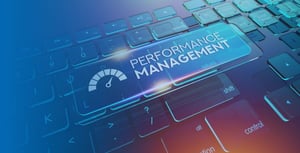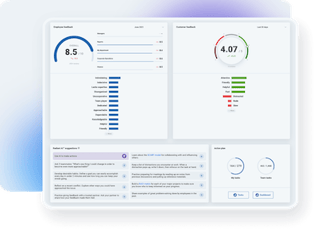
Should You Use AI in Employee Performance Reviews? Pros, Cons & Best Practices
This indicates a huge gap between what HR leaders hope to achieve with performance evaluations and the results in terms of employee engagement. AI performance reviews are not a flawless solution to gaps in the performance review process. However, like other uses for this revolutionary technology, AI performance management has distinct advantages over older methods.
TL;DR – Should you use AI in performance reviews?
Yes. AI is worth using in performance reviews if you keep managers in control and treat AI outputs as a draft, not a decision.
Top benefits of AI in performance reviews
- More objective, higher-quality assessments by analyzing manager notes, peer feedback, self-evaluations, and performance history.
- Real-time insights and more frequent feedback instead of a single annual review.
- Greater efficiency and consistency as AI summarizes inputs and drafts reviews.
- More personalized development plans by surfacing patterns, strengths, and skill gaps.
Key drawbacks and risks to manage
- Overreliance on AI outputs that may miss nuance or context.
- Possible errors or “hallucinations” if prompts or data are unclear.
- Data privacy and security concerns when using non-secure or consumer AI tools.
What is AI in performance reviews?
AI in performance reviews refers to the use of artificial intelligence tools to analyze performance data and help managers create fair, consistent employee evaluations more quickly.
AI for performance reviews uses artificial intelligence to help managers create clear, fair, and actionable employee evaluations and appraisals. Instead of manually sorting through notes, feedback, and performance data, managers can use AI employee evaluation tools to quickly analyze multiple sources of information, spot important trends, and generate unbiased reviews. This saves managers time, gives employees more accurate and useful feedback, and helps HR teams easily track performance across the company. But like any new technology, it’s important to understand both the benefits and potential challenges before you dive in.
Consider these pros and cons of integrating AI performance reviews into your employee engagement strategy and HR process. As with any new workflow, you need to know the benefits of using AI for performance as well as the potential setbacks.
Pro #1: How AI creates higher-quality performance assessments

As managers conduct performance evaluations using conventional methods, they rely on their subjective decision-making. However, human errors are all too common. Recency bias is one way that employee performance can be misjudged. It happens when a manager weighs an employee’s recent actions more heavily than their overall performance.
AI performance management is not subject to human errors. Generative AI can supply objective data that creates the full picture of an employee’s performance, including not only their recent actions but also their broader career progression.
Using AI tools, managers can expedite the evaluations by efficiently identifying data patterns from numerous inputs, including peer feedback, historical performance data, self-evaluations, and L&D outcomes. This leads to more actionable and evidence-based decisions than any manager, no matter how devoted, could generate.
In addition, higher-quality assessments can lead to more personalized career plans for individual employees. With only 31% of employees, a 10 year low, reporting that they feel engaged at work, the ability to customize each employee’s development based on their performance and career progression gives HR leaders many more ways to put the human element back into their performance feedback.
Pro #2: Getting real-time performance insights with AI
Annual employee evaluations and performance reviews used to be broad snapshots of employee performance feedback over long periods. Creating actionable strategies from these reviews was taxing. Timely guidance that not only assesses employees but also engages them relies on real-time feedback.
When utilizing AI to write performance reviews, business owners can request feedback anytime. Employees can request it too, expanding the feedback loop and lowering the pressure of the “yearly review time”.
An effective performance review is not a judgment but an open dialogue between an employee and their HR managers. When conducted this way, businesses can assess and improve their employees’ engagement in real time.
Consider that in 2024, the engagement factors that declined the most from the previous polling period were:
-
Clarity of expectations. Only 46% of employees clearly know what's expected of them at work, down from 56% in March 2020.
-
Feeling someone at work cares about them as a person. Just 39% of employees strongly feel someone at work cares about them, a drop from 47% in March 2020.
-
Someone encouraging their development. Only 30% strongly agree that someone at work encourages their growth, down from 36% in March 2020.
By using AI technology to turn performance reviews into ongoing conversations, businesses can clarify these responsibilities and expectations for each employee. Rather than rely on company-wide initiatives for engagement, businesses can personalize them, which is a key engagement factor in the post-pandemic workforce.
![]()
Pro #3: Making performance reviews more efficient with AI-powered employee evaluation tools
In addition to collecting and analyzing employee data, generative AI can also consolidate it. One of the benefits of using AI for performance reviews is that it can summarize feedback from multiple sources, including internal platforms like emails, peer reviews, other performance reports, and more.
Generative AI can also write performance reviews based on key insights, saving administrative time. If you’ve ever been stuck for the right word or phrasing when writing a feedback survey, generative AI can do that thinking for you.
AI performance reviews respond to custom criteria, so you can define your employee goals in the surveys, prompt them for your KPIs, and easily edit them until you get a draft that looks perfect. The entire process of putting the review together is easier, which saves your managers time that they can now devote to using the assessments, rather than just making them.
Additionally, employees no longer have to wait for the “review period” to receive feedback reports on their performance. Since they’re easier to make, they can be administered more frequently, allowing managers to use feedback as an opportunity to create an environment of continuous learning.
Pro #4: Fewer inaccuracies
Many employees leave their performance reviews unsure of how to apply them to their jobs. Most think the review was inaccurate or subject to performance bias, which is when moderators pay more or less attention to participants depending on their expectations.
AI performance management irons out these errors and assures employees that the assessment is fair. The AI can pull from more data sources than human moderators, objectively identifying the patterns that form the assessment. It can even offer suggestions for actionable strategies to improve engagement.
Ultimately, your business’s course of action is up to your HR manager. By using AI, they simply have a bigger picture to work with, which improves their ability to tailor the strategy to the engagement you hope to achieve.
process?
Pro #5: Customizable input
AI performance reviews can respond to custom inputs to generate better strategies than automated systems of the past. Consider a scenario where a specific employee could improve on their collaboration skills. This could be posed to generative AI as a custom query, such as:
How can [X employee] improve their collaboration skills? Consider that they were given [this feedback] last year to address this issue.
Your managers will no longer have to implement generalized feedback to all employees as the data concerning each one can be easily itemized with AI. Customized inputs lead to customized outputs with AI performance management. Your employees won’t feel like a passive observer of their own career when you open the performance feedback dialogue with them. They will feel like an active participant.
How to use AI in performance reviews: practical applications

Performance evaluations generated or aided by AI tools do more than just free up managers’ time. They offer tangible uses that help businesses achieve the intended goal of any performance review: increasing employee engagement. They do this through a combination of custom inputs, multiple feedback sources, and objective insights.
Consider these example uses of AI performance management:
Helping an employee develop a personalized career plan
Employee engagement is on the decline because many employees don’t feel they have opportunities to advance their career path. AI performance reviews customized for each employee based on numerous data sets – including their past reports, their colleagues’ feedback, and even their skill maps – engage employees in their own assessment.
The question could be posed like this:
Analyze [this employee’s] major career achievements from [this list]. Extract the major themes from this list, including hard and soft skills. What skills are most important for the employee to improve to continue developing their career?
Using AI, managers can show workers how they can advance their careers. AI can give them a career projection, help them upskill, and engage them in their learning, a proven way to increase employee retention and satisfaction.
Analyzing data in real time
We’ve established that AI-powered performance reviews can analyze numerous sources and generate insights free from human biases. Its ability to do this in real time with continuous insights is how it helps managers create environments of continuous learning.
Only 20% of employees strongly trust their business leaders, according to Gallup. Yet, this number skyrockets to 95% when managers support three policies: lead changes, clear communication, and inspiration for future prospects.
Real-time data analysis keeps your managers’ finger on the pulse of your workplace community. This is even more significant in a post-pandemic economy, when so many employees are switching to a remote or hybrid work model. With so many employees physically distant from the workplace, managers need ways of fostering continuous learning environments. Continuous real-time data generated by AI performance reviews is one way.
Writing the performance reviews
HR managers can write performance reviews using generative AI. But they don’t have to feel like a “template.” This technology has the capability to produce evaluations that are authentic and original. One of the upsides is that managers no longer have to waste time on specific wording. They can generate the performance review using only the broad insights. For example, you could type,
Focusing on [these traits/skills], write a performance review using a positive tone. Offer alternate vocabulary where applicable to create a personalized review for [this employee].
With the time that managers save on writing the reviews, they can devote more effort to turning the review insights into actionable engagement.
Now that we've covered the benefits and practical uses of AI in performance reviews, let's answer some common questions managers and HR teams often have about using AI in their review process.
FAQs:
Yes. AI can help you write employee performance reviews by turning raw data into clear, structured summaries.
Tools like Macorva's Radiant AI® pull in:
- Manager notes
- 1:1 and check-in notes
- Peer and 360 feedback
- Self-evaluations
- Customer feedback and CX data
- Goals, OKRs, and historical performance
From there, AI generates a draft review that highlights strengths, opportunities, and concrete next steps. Managers still review, edit, and approve every document before it’s shared, so the final review is accurate and aligned with your culture.
Using AI to write a performance review is a simple, repeatable process:
-
Centralize your data: Make sure you have manager notes, peer feedback, self-evaluations, goals, and relevant metrics in one place (Macorva does this automatically).
-
Set your criteria: Tell the AI what you want to focus on (for example: teamwork, results, leadership, development).
-
Generate a draft: Use your AI performance review tool to create a draft based on the data and criteria you’ve selected.
-
Review for accuracy and tone: Managers edit the draft to add context, adjust wording, and confirm that examples are correct.
-
Finalize and share: Approve the review, then deliver it in a live conversation with the employee.
Platforms like Macorva streamline this by combining all your EX, CX, and performance data and walking managers through a guided, step-by-step workflow.
AI-generated reviews significantly reduce bias by relying on objective data rather than subjective opinions alone. However, it's important for managers to carefully review each evaluation to ensure context is accurately captured. Macorva’s built-in risk analysis further helps managers identify unsupported statements or potential biases before finalizing reviews.
Data security is critical when using any technology in HR processes. Platforms like Macorva are specifically designed with strict security standards (SOC 2 certification, GDPR and HIPAA compliance) to protect sensitive employee information. Additionally, Macorva ensures your inputs are not stored or used as training data by external systems.
No. AI will not replace managers in performance reviews.
AI is best used as a co-pilot, not a manager replacement. It can:
- Collect and summarize performance data
- Suggest wording and structure for reviews
- Surface trends and risks across teams
Managers still need to:
- Set expectations and goals
- Coach, listen, and give real-time feedback
- Make pay, promotion, and development decisions
- Have the actual conversation with each employee
Macorva’s AI is designed to save managers time and reduce bias—while keeping humans fully in control of decisions and delivery.
Introducing AI into your review process works best when you’re open and specific. You can:
-
Explain the “why”: Share your goals: more fairness, less admin work, more frequent feedback, and clearer development plans.
-
Be clear about how AI is used: For example: “AI will help summarize data and suggest draft wording. Your manager still reviews, edits, and approves your review.”
-
Address privacy and security: Tell employees what data is used, how it's protected, and what standards you meet.
-
Start with a pilot: Test AI performance reviews with a few teams, gather feedback, and refine your process before rolling it out widely.
-
Train managers and employees: Show both groups how the tools work and what “good” AI-assisted reviews look like.
This builds trust and helps people see AI as a support, not a threat.
AI-generated reviews feel “robotic” when the inputs are generic and managers accept the draft without changes. To keep them personal, you need rich, specific information going into the system and a human touch on the way out—real examples from projects and 1:1s, key moments, and clear links to the employee’s goals and career path.
You can also guide the AI to use your company’s voice, such as asking for a clear, supportive tone instead of very formal language. Managers should always review the draft and adjust any stiff or repeated phrases so the final review sounds like it comes from a real person who knows the employee.
You’ll know AI is helping when you see measurable changes in your performance evaluations and employee appraisals process. Some key areas you should track include:
-
Time saved: How many hours do managers save on writing and compiling reviews?
-
Completion and consistency: Are more reviews finished on time? Do they follow a consistent structure?
-
Employee feedback: Do employees say reviews feel clearer, more fair, and more actionable?
-
Manager confidence: Do managers feel better equipped with data and coaching guidance?
-
Business outcomes: Are you seeing improvements in engagement scores, reduced regrettable turnover, or stronger performance against goals?
Macorva makes this easier by combining EX, CX, and performance data in one platform, so you can see how AI-assisted reviews connect to actual engagement and results over time.

Drawbacks of AI in performance reviews
Like any emerging technology, AI is not without its flaws. Recognizing the limitations of AI technology is crucial for its successful incorporation into your workflow. Reflect on these potential challenges and strategies for mitigating them:
Con #1: Potential for misleading results
Sometimes, AI can generate misleading results, a phenomenon known as “hallucination”. This can happen to AI on a case-by-case basis, often as a result of conflicting inputs. Additionally, AI has the potential to make incorrect inferences from otherwise accurate data, posing a concern for businesses.
This is why Macorva has custom settings that don’t exist on AI programs like ChatGPT. With Macorva, users are able to generate summaries only, receive data citations, and get less “creative” answers. Additionally, we perform a final AI legal risk analysis on your finished insights to minimize the possibility of errors.
No matter the AI your business adopts, your managers need to know that generated responses are not infallible. Treat the AI’s results as a first draft, and remember to always review and approve documents before finalizing them.
Con #2: Learning curve
There’s also a potential learning curve with AI. For example, your manager may not review the first draft created by the AI before submitting it. Additionally, the AI may respond with an error or require differently worded inputs to produce a useful result. In many cases, business teams struggle with adopting AI due to this learning curve.
Macorva streamlines AI adoption for business teams by embedding intuitive and straightforward features directly into our platform. We’ve equipped our built-in performance review workflow with detailed instructions, making critical information readily accessible to all team members. A crucial component of our approach is the mandatory step-by-step approval process for managers, ensuring every personal review is completed. This not only facilitates a smoother transition but also emphasizes our commitment to maintaining the accuracy and integrity of the reviews through required managerial oversight and approval.
But remember that AI can never completely eliminate human error from your performance review process. It can improve the efficiency and effectiveness of human insights, but your managers still need to know that these programs have limitations.
While your business must commit to adopting AI systems, it must also commit to additional technical training and education to ensure that your teams use them effectively. Macorva facilitates this shift through its AI performance management tools, which are designed to be both user-friendly and adaptable, aligning with your organization's quality assurance requirements.
Con #3: Security concerns
Many business executives fear the possibility that AI systems are insecure. On their own, they can be. Everything you input into an AI is saved by default and used as training data to improve the system. This means that potentially vital company and personal employee data is stored by these systems, posing a potential security risk.
Depending on the industry, AI tools also have legal, ethical, and practical restrictions that will prevent some businesses from using them. For example, the images generated by AI can have a complex legal status that changes depending on the AI you use.
This is why Macorva uses enterprise-grade APIs with built-in security features that don’t exist on the AI by default. Additionally, using Macorva’s tools, your inputs will be deleted after submission instead of being submitted as training data. This helps protect your managers and employees from having their data saved and exploited by a system out of your control.

The takeaway for businesses
AI performance reviews undoubtedly have the potential to fill major gaps in traditional review methods. When used correctly, they can personalize data outputs and engage employees in their career progression through a performance review process that more resembles a dialogue than a critique. They can make the entire review process more efficient while enhancing your managers’ ability to turn feedback into an opportunity for continuous learning.
However, despite the benefits of using AI for performance, a human element is still vital to the success of your performance feedback process. Macorva enhances AI productivity with added safeguards, custom priorities, and security features to ensure that you get the most out of your reformed performance reviews. But more than that, our performance management tools ensure that your automated responses will enhance your employees’ engagement with their company’s brand, their managers, and their own careers. The AI’s responses may be automated, but its applications must always remain human.
To see Macorva’s AI performance management solution in action, watch this video.
Additional resources on AI in performance management:
- Feature overview: Radiant AI® Performance Review Workflow
- On-demand Webinar: Pros and Cons of Using AI in Employee Performance Reviews
Editors note: this blog was originally published in March 2024 and has been updated for accuracy and comprehensiveness.









